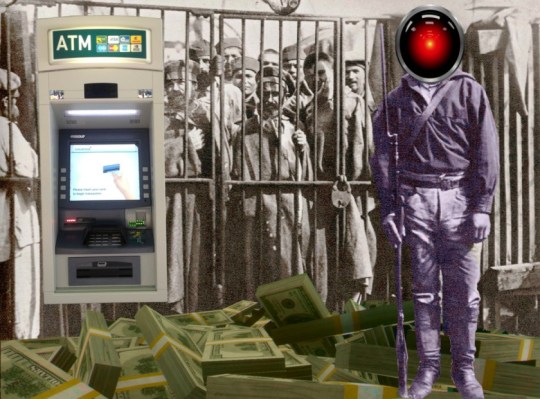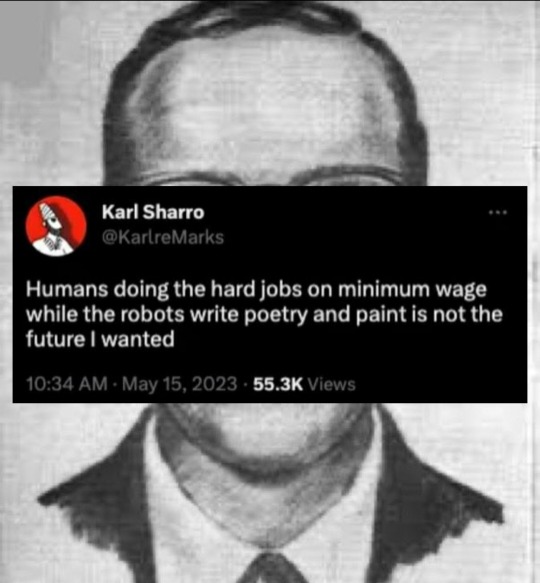#Prison Tech
Explore tagged Tumblr posts
Text
FCC strikes a blow against prison profiteering

TOMORROW NIGHT (July 20), I'm appearing in CHICAGO at Exile in Bookville.

Here's a tip for policymakers hoping to improve the lives of the most Americans with the least effort: help prisoners.
After all, America is the most prolific imprisoner of its own people of any country in world history. We lock up more people than Stalin, than Mao, more than Botha, de Klerk or any other Apartheid-era South African president. And it's not just America's vast army of the incarcerated who are afflicted by our passion for imprisonment: their families and friends suffer, too.
That familial suffering isn't merely the constant pain of life without a loved one, either. America's prison profiteers treat prisoners' families as ATMs who can be made to pay and pay and pay.
This may seem like a losing strategy. After all, prison sentences are strongly correlated with poverty, and even if your family wasn't desperate before the state kidnapped one of its number and locked them behind bars, that loved one's legal defense and the loss of their income is a reliable predictor of downward social mobility.
Decent people don't view poor people as a source of riches. But for a certain kind of depraved sadist, the poor are an irresistible target. Sure, poor people don't have much money, but what they lack even more is protection under the law ("conservativism consists of the principle that there is an in-group whom the law protects but does not bind, and an out-group whom the law binds but does not protect" -Wilhoit). You can enjoy total impunity as you torment poor people, make them so miserable and afraid for their lives and safety that they will find some money, somewhere, and give it to you.
Mexican cartels understand this. They do a brisk trade in kidnapping asylum seekers whom the US has illegally forced to wait in Mexico to have their claims processed. The families of refugees – either in their home countries or in the USA – are typically badly off but they understand that Mexico will not lift a finger to protect a kidnapped refugee, and so when the kidnappers threaten the most grisly tortures as a means of extracting ransom, those desperate family members do whatever it takes to scrape up the blood-money.
What's more, the families of asylum seekers are not much better off than their kidnapped loved ones when it comes to seeking official protection. Family members who stayed behind in human rights hellholes like Bukele's El Salvador can't get their government to lodge official complaints with the Mexican ambassador, and family members who made it to the USA are in no position to get their Congressjerk to intercede with ICE or the Mexican consulate. This gives Mexico's crime syndicates total latitude to kidnap, torture, and grow rich by targeting the poorest, most desperate people in the world.
The private contractors that supply services to America's prisons are basically Mexican refugee-kidnappers with pretensions and shares listed on the NYSE. After decades of consolidation, the prison contracting sector has shrunk to two gigantic companies: Securus and Viapath (formerly Global Tellink). These private-equity backed behemoths dominate their sector, and have diversified, providing all kinds of services, from prison cafeteria meals to commissary, the prison stores where prisoners can buy food and other items.
If you're following closely, this is one of those places where the hair on the back of your neck starts to rise. These companies make money when prisoners buy food from the commissary, and they're also in charge of the quality of the food in the mess hall. If the food in the mess hall is adequate and nutritious, there's no reason to buy food from the commissary.
This is what economists call a "moral hazard." You can think of it as the reason that prison ramen costs 300% more than ramen in the free world:
https://pluralistic.net/2024/04/20/captive-market/#locked-in
(Not just ramen: in America's sweltering prisons, an 8" fan costs $40, and the price of water went up in Texas prisons by 50% during last summer's heatwave.)
It's actually worse than that: if you get sick from eating bad prison food, the same company that poisoned you gets paid to operate the infirmary where you're treated:
https://theappeal.org/massachusetts-prisons-wellpath-dentures-teeth/
Now, the scam of abusing prisoners to extract desperate pennies from their families is hardly new. There's written records of this stretching back to the middle ages. Nor is this pattern a unique one: making an unavoidable situation as miserable as possible and then upcharging people who have the ability to pay to get free of the torture is basically how the airlines work. Making coach as miserable as possible isn't merely about shaving pennies by shaving inches off your legroom: it's a way to "incentivize" anyone who can afford it to pay for an upgrade to business-class. The worse coach is, the more people you can convince to dip into their savings or fight with their boss to move classes. The torments visited upon everyone else in coach are economically valuable to the airlines: their groans and miseries translate directly into windfall profits, by convincing better-off passengers to pay not to have the same thing done to them.
Of course, with rare exceptions (flying to get an organ transplant, say) plane tickets are typically discretionary. Housing, on the other hand, is a human right and a prerequisite for human thriving. The worse things are for tenants, the more debt and privation people will endure to become home-owners, so it follows that making renters worse off makes homeowners richer:
https://pluralistic.net/2021/06/06/the-rents-too-damned-high/
For Securus and Viapath, the path to profitability is to lobby for mandatory, long prison sentences and then make things inside the prison as miserable as possible. Any prisoner whose family can find the funds can escape the worst of it, and all the prisoners who can't afford it serve the economically important function of showing the prisoners whose families can afford it how bad things will be if they don't pay.
If you're thinking that prisoners might pay Securus, Viapath and their competitors out of their own prison earnings, forget it. These companies have decided that the can make more by pocketing the difference between the vast sums paid by third parties for prisoners' labor and the pennies the prisoners get from their work. Remember, the 13th Amendment specifically allows for the enslavement of incarcerated people! Six states ban paying prisoners at all. North Carolina caps prisoners' wages at one dollar per day. The national average prison wage is $0.52/hour. Prisoners' labor produces $11b/year in goods and services:
https://www.dollarsandsense.org/archives/2024/0324bowman.html
Forced labor and extortion are a long and dishonorable tradition in incarceration, but this century saw the introduction of a novel, exciting way of extracting wealth from prisoners and their families. It started when private telcos took over prison telephones and raised the price of a prison phone call. These phone companies found willing collaborators in local jail and prison systems: all they had to do was offer to split the take with the jailers.
With the advent of the internet, things got far worse. Digitalization meant that prisons could replace the library, adult educations, commissary accounts, letter-mail, parcels, in-person visits and phone calls with a single tablet. These cheaply made tablets were offered for free to prisoners, who lost access to everything from their kids' handmade birthday cards to in-person visits with those kids.
In their place, prisoners' families had to pay huge premiums to have their letters scanned so that prisoners could pay (again) to view those scans on their tablets. Instead of in-person visits, prisoners families had to pay $3-10/minute for a janky, postage-stamp sized video. Perversely, jails and prisons replaced their in-person visitation rooms with rooms filled with shitty tablets where family members could sit and videoconference with their incarcerated loved ones who were just a few feet away:
https://pluralistic.net/2024/02/14/minnesota-nice/#shitty-technology-adoption-curve
Capitalists hate capitalism. The capital classes are on a relentless search for markets with captive customers and no competitors. The prison-tech industry was catnip for private equity funds, who bought and "rolled" up prison contractors, concentrating the sector into a duopoly of debt-laden companies whose ability to pay off their leveraged buyouts was contingent on their ability to terrorize prisoners' families into paying for their overpriced, low-quality products and services.
One particularly awful consequence of these rollups was the way that prisoners could lose access to their data when their prison's service-provider was merged with a rival. When that happened, the IT systems would be consolidated, with the frequent outcome that all prisoners' data was lost. Imagine working for two weeks to pay for a song or a book, or a scan of your child's handmade Father's Day card, only to have the file deleted in an IT merger. Now imagine that you're stuck inside for another 20 years.
This is a subject I've followed off and on for years. It's such a perfect bit of end-stage capitalist cruelty, combining mass incarceration with monopolies. Even if you're not imprisoned, this story is haunting, because on the one hand, America keeps thinking of new reasons to put more people behind bars, and on the other hand, every technological nightmare we dream up for prisoners eventually works its way out to the rest of us in a process I call the "shitty technology adoption curve." As William Gibson says, "The future is here, it's just not evenly distributed" – but the future sure pools up thick and dystopian around America's prisoners:
https://pluralistic.net/2021/02/24/gwb-rumsfeld-monsters/#bossware
My background interest in the subject got sharper a few years ago when I started working on The Bezzle, my 2023 high-tech crime thriller about prison-tech grifters:
https://us.macmillan.com/books/9781250865878/thebezzle
One of the things that was on my mind when I got to work on that book was the 2017 court-case that killed the FCC's rules limit interstate prison-call gouging. The FCC could have won that case, but Trump's FCC chairman, Ajit Pai, dropped it:
https://arstechnica.com/tech-policy/2017/06/prisoners-lose-again-as-court-wipes-out-inmate-calling-price-caps/
With that bad precedent on the books, the only hope prisoners had for relief from the FCC was for Congress to enact legislation specifically granting the agency the power to regulate prison telephony. Incredibly, Congress did just that, with Biden signing the "Martha Wright-Reed Just and Reasonable Communications Act" in early 2023:
https://www.congress.gov/bill/117th-congress/senate-bill/1541/text
With the new law in place, it fell to the FCC use those newfound powers. Compared to agencies like the FTC and the NLRB, Biden's FCC has been relatively weak, thanks in large part to the Biden administration's refusal to defend its FCC nomination for Gigi Sohn, a brilliant and accomplished telecoms expert. You can tell that Sohn would have been a brilliant FCC commissioner because of the way that America's telco monopolists and their allies in the senate (mostly Republicans, but some Democrats, too) went on an all-out offensive against her, using the fact that she is gay to smear her and ultimately defeat her nomination:
https://pluralistic.net/2023/03/19/culture-war-bullshit-stole-your-broadband/
But even without Sohn, the FCC has managed to do something genuinely great for America's army of the imprisoned. This week, the FCC voted in price-caps on prison calls, so that call rates will drop from $11.35 for 15 minutes to just $0.90. Both interstate and intrastate calls will be capped at $0.06-0.12/minute, with a phased rollout starting in January:
https://arstechnica.com/tech-policy/2024/07/fcc-closes-final-loopholes-that-keep-prison-phone-prices-exorbitantly-high/
It's hard to imagine a policy that will get more bang for a regulator's buck than this one. Not only does this represent a huge savings for prisoners and their families, those savings are even larger in proportion to their desperate, meager finances.
It shows you how important a competent, qualified regulator is. When it comes to political differences between Republicans and Democrats, regulatory competence is a grossly underrated trait. Trump's FCC Chair Ajit Pai handed out tens of billions of dollars in public money to monopoly carriers to improve telephone networks in underserved areas, but did so without first making accurate maps to tell him where the carriers should invest. As a result, that money was devoured by executive bonuses and publicly financed dividends and millions of Americans entered the pandemic lockdowns with broadband that couldn't support work-from-home or Zoom school. When Biden's FCC chair Jessica Rosenworcel took over, one of her first official acts was to commission a national study and survey of broadband quality. Republicans howled in outrage:
https://pluralistic.net/2023/11/10/digital-redlining/#stop-confusing-the-issue-with-relevant-facts
The telecoms sector has been a rent-seeking, monopolizing monster since the days of Samuel Morse:
https://pluralistic.net/2024/07/18/the-bell-system/#were-the-phone-company-we-dont-have-to-care
Combine telecoms and prisons, and you get a kind of supermonster, the meth-gator of American neofeudalism:
https://www.nbcnews.com/news/us-news/tennessee-police-warn-locals-not-flush-drugs-fear-meth-gators-n1030291
The sector is dirty beyond words, and it corrupts everything it touches – bribing prison officials to throw out all the books in the prison library and replace them with DRM-locked, high-priced ebooks that prisoners must toil for weeks to afford, and that vanish from their devices whenever a prison-tech company merges with a rival:
https://pluralistic.net/2024/04/02/captive-customers/#guillotine-watch
The Biden presidency has been fatally marred by the president's avid support of genocide, and nothing will change that. But for millions of Americans, the Biden administration's policies on telecoms, monopoly, and corporate crime have been a source of profound, lasting improvements.
It's not just presidents who can make this difference. Millions of America's prisoners are rotting in state and county jails, and as California has shown, state governments have broad latitude to kick out prison profiteers:
https://pluralistic.net/2023/05/08/captive-audience/#good-at-their-jobs

Support me this summer on the Clarion Write-A-Thon and help raise money for the Clarion Science Fiction and Fantasy Writers' Workshop!

If you'd like an essay-formatted version of this post to read or share, here's a link to it on pluralistic.net, my surveillance-free, ad-free, tracker-free blog:
https://pluralistic.net/2024/07/19/martha-wright-reed/#capitalists-hate-capitalism

Image: Cryteria (modified) https://commons.wikimedia.org/wiki/File:HAL9000.svg
CC BY 3.0 https://creativecommons.org/licenses/by/3.0/deed.en
--
Flying Logos (modified) https://commons.wikimedia.org/wiki/File:Over_$1,000,000_dollars_in_USD_$100_bill_stacks.png
CC BY-SA 4.0 https://creativecommons.org/licenses/by-sa/4.0/deed.en
--
kgbo (modified) https://commons.wikimedia.org/wiki/File:Suncorp_Bank_ATM.jpg
CC BY-SA 3.0 https://creativecommons.org/licenses/by-sa/3.0/deed.en
#pluralistic#prison tech#fcc#martin hench#marty hench#the bezzle#captive audiences#carceral state#worth rises#bezzles#Martha Wright-Reed Just and Reasonable Communications Act#capitalists hate capitalism#shitty technology adoption curve
348 notes
·
View notes
Text


Prison tech maybe? I kinda doubt it cuz it has screws but he’s stunning either way
I wanna crank bro up and hear him sing
Those solder marks eoughhhh
#techum#sfw objectum#tech love#objectum#object appreciation#old tech#posic#prison tech#y2k#clear tech
12 notes
·
View notes
Text
57 notes
·
View notes
Text
A fact a lot of people don’t know is that the market for completely transparent tech like this is propped up by the prison system.
Prisons will often only allow transparent radios, TVs and the like to prevent contraband from being smuggled inside it.
Here’s a video on the topic: https://www.youtube.com/watch?v=O3PfsndsihY

Translucent CRT Television By KTV
1K notes
·
View notes
Text
❤️✨️TBB Headcanons✨️🖤
- The Batch knew 99 as cadets, Hunter was closest with him and was absolutely devastated when he died: They don't ever mention it because it still hurts too much
+++
- Echo is ALL about the essential oils, lavender is his favorite 🧚🏼♀️
+++
- Tech isn't nearly as awkward as you would think when it comes to physical connections, he understands the human need for it: He'll never admit that it's the only time his brain slows down
+++
- Wrecker, in the KINDEST way possible, smells like Home Depot…rugged, earthy, manly 🏕
+++
- Crosshair smoked for a short while, Hunter was the one who convinced him to stop
+++
- Tech plays music in his headset when he's tinkering with the ship, he often sings/hums along: He has the best voice out of any of them and he isn't shy about it 💃🏻🎤
+++
- Hunter can't drink caf, it furthers the effects of his heightened senses: He likes the scent though
+++
- Wrecker's socks NEVER match, this drives Echo NUTS 🧦
+++
- Omega idolizes Hunter and Crosshair's tattoos, they tell her “absolutely not, you cannot get a face tattoo”/”we made poor life decisions when we were younger”: When she gets older, she ops for one at the base of her neck-Crosshair designs it for her
+++
- Echo brings a souvenir back for Omega every single time he leaves the Batch: It's his love language 🥲
+++
- Tech has insomnia but when he DOES fall asleep, he falls asleep HARD: Omega always wraps him in a blanket and takes his goggles off for him
+++
- Wrecker is the most emotionally intelligent when it comes to women & the others say that besides brute strength, understanding ladies is his superpower: He is the ultimate girl dad 💅🏻🎀
#this fandom is a fucking prison#no escape#this is canon#i will not elaborate#star wars#clone force 99#the bad batch#sw tbb#tbb hunter#tbb crosshair#tbb tech#tbb wrecker#tbb echo#tbb omega#star wars headcanons#bad batch headcanons
102 notes
·
View notes
Text
Crosshair: Do you think I’m going too far?
Tech: No no you went too far seven hours ago. Now you’re going to prison.
#Crosshair: you mean WE’RE going to prison#tech is acting as if he wasn’t an active participant in whatever Crosshair was doing#in fact he was the one who came up with the plan#they’re twins your honor#bad batch twins#batch twins#they’re twins#tech and crosshair are twins#star wars tbb#star wars the bad batch#tbb crosshair#the bad batch#incorrect bad batch quotes#tbb tech#tbb incorrect quotes
352 notes
·
View notes
Text
I'm fully convinced that the Master has been doing that whole thing where he announces himself to the Doctor and monologues about his evil plan - most apparent with Delgado!Master, imo, but he's not the only one - with the deliberate goal that IF things should go wrong and the newest plan blows up in his face, the Doctor will be there to save him.
Related headcanon: Those early D/M shenanigans reduced the Doctor's sentence by a lot, a reward for good behavior. I mean, it's not even a headcanon. The Timelords literally let Three use his Tardis again so he could deal with the Master. Because the Master had made himself the Doctor's problem. Because he just happened to want to conquer the planet the Doctor was exiled on.
#doctor who#best enemies#I've been rewatching Classic Who recently can you tell?#and yeah there are also other goals such as Showing Off and Being An Annoyance ofc#and also conquering Earth. though that one is just the vehicle for Showing Off And Being Annoying To The Doctor#but part of me wonders if it was just that or if there actually had been a Plan#I mean I get the Doylist reason why the Master did what he did#but from in-story it looks like he took a battering ram to the PRISON his buddy was being held in#and then pretended like it was the building and its tech he was interested in. despite calling it a shithole and the people in it backwards
66 notes
·
View notes
Text
(Not sure if this idea has been floated already, I'm relatively new to tumblr)
I'm convinced the finale is going to have plenty of callbacks to the Bad Batch's intro story in TCW (I mean, we've already gotten a few callbacks).
So...
Since Tech was the one who directly helped Rex find and retrieve Echo, and then carried Echo through the shafts...

What if Echo is the one to find Tech and carry him out of Tantiss???
#because tech IS alive#if he's not cx2 he's being held prisoner somewhere on tantiss#and his family is going to rescue him#because that's what they do#and they're all going to survive and live together in (relative) peace far away from palpatine#and i'm going to cry tears of joy#no i am not crying right now I don't know what you're talking about#tbb#sw tbb#the bad batch#star wars the bad batch#tbb echo#tbb tech#tbb speculation#tech lives
336 notes
·
View notes
Text
Kickstarting “The Bezzle” audiobook, sequel to Red Team Blues

I'm heading to Berlin! On January 29, I'll be delivering Transmediale's Marshall McLuhan Lecture, and on January 30, I'll be at Otherland Books (tickets are limited! They'll have exclusive early access to the English edition of The Bezzle and the German edition of Red Team Blues!).

I'm kickstarting the audiobook for The Bezzle, the sequel to last year's Red Team Blues, featuring Marty Hench, a hard-charging, two-fisted forensic accountant who spent 40 years in Silicon Valley, busting every finance scam hatched by tech bros' feverish imaginations:
http://thebezzle.org
Marty Hench is a great character to write. His career in high-tech scambusting starts in the early 1980s with the first PCs and stretches all the way to the cryptocurrency era, the most target-rich environment for scamhunting tech has ever seen. Hench is the Zelig of tech scams, and I'm having so much fun using him to probe the seamy underbelly of the tech economy.
Enter The Bezzle, which will be published by Tor Books and Head of Zeus on Feb 20: this adventure finds Marty in the company of Scott Warms, one of the many bright technologists whose great startup was bought and destroyed by Yahoo! (yes, they really used that asinine exclamation mark). Scott is shackled to the Punctuation Factory by golden handcuffs, and he's determined to get fired without cause, so he can collect his shares and move onto the next thing.
That's how Scott and Marty find themselves on Catalina island, the redoubt of the Wrigley family, where bison roam the hills, yachts bob in the habor and fast food is banned. Scott invites Marty on a series of luxury vacations on Catalina, which end abruptly when they discover – and implode – a hamburger-related Ponzi scheme run by a real-estate millionaire who is destroying the personal finances of the Island's working-class townies out of sheer sadism.
Scott's victory is bittersweet: sure, he blew up the Ponzi scheme, but he's also made powerful enemies – the kinds of enemies who can pull strings with the notoriously corrupt LA County Sheriff's Deputies who are the only law on Catalina, and after taking a pair of felony plea deals, Scott gets the message and never visits Catalina Island again.
That could have been the end of it, but California's three-strikes law – since rescinded – means that when Scott picks up one more felony conviction for some drugs discovered during a traffic stop, he's facing life in prison.
That's where The Bezzle really gets into gear.
At its core, The Bezzle is a novel about the "shitty technology adoption curve": the idea that our worst technological schemes are sanded smooth on the bodies of prisoners, mental patients, kids and refugees before they work their way up the privilege gradient and are inflicted on all of us:
https://pluralistic.net/2023/04/12/algorithmic-wage-discrimination/#fishers-of-men
America's prisons are vicious, brutal places, and technology has only made them worse. When Scott's prison swaps out in-person visits, the prison library, and phone calls for a "free" tablet that offers all these services as janky apps that cost ten times more than they would on the outside, the cruelty finds a business model.
Working inside and outside the prison Marty Hench and Scott Warms figure out the full nature of the scam that the captive audience of prisoners are involuntary beta-testers for, and they discover a sprawling web of real-estate fraud, tech scams, and offshore finance that is extracting fortunes from the hides of America's prisoners and their families. The criminals who run that kind of enterprise aren't shy about fighting for what they've got, and they're more than happy to cut some of LA County's notorious deputy gangs in for a cut in exchange for providing some kinetic support for the project.
The Bezzle is exactly the kind of book I was hoping I'd get to write when I kicked off the Hench series – one that decodes the scam economy, from music royalties to prison videoconferencing, real estate investment trusts to Big Four accounting firm bogus audits. It's both a fast-moving, two-fisted crime novel and a masterclass on how the rich and powerful get away with both literal and figurative murder.
It's getting a big push from both my publishers and I'll be touring western Canada and the US with it. The early reviews are spectacular. But despite all of this, I had to make my own audiobook for it, which I'm pre-selling on Kickstarter:
http://thebezzle.org
Why? Because Audible – Amazon's monopoly gatekeeper to the audiobook world, with more than 90% of the market – refuses to carry my work.
Audible uses Digital Rights Management to lock every audiobook they sell to their platform. Legally, only an Audible-authorized app can decrypt and play the audiobooks they sell you. Distributing a tool that removes Audible DRM is a felony under Section 1201 of the 1998 DMCA.
That means that if you break up with Audible – delete your Audible apps – you will lose your entire audiobook library. And the fact that you're Audible's hostage makes the writers you love into their hostages, too. Writers understand that if they leave the Audible platform, their audience will have to choose between following them, or losing all their audiobooks.
That's how Audible gets away with abusing its performers and writers, up to and including the $100m Audiblegate wage-theft scandal:
https://www.audiblegate.com/
Audible can steal $100m from its writers…and the writers still continue to sell on the platform, because leaving will cost them their audience.
This is canonical enshittification: lock in users, then screw suppliers. Lots of companies abuse DRM to do this, but none can hold a candle to Amazon, who understand that the DMCA is a copyright law that protects corporations at the expense of creators.
Under DMCA 1201 commercial distribution of a "circumvention device" carries a five-year prison sentence and a $500,000 fine. That means that if I write a book, pay to have it recorded, and then sell it to you through Audible, I am criminally prohibited from giving you the tool to take it from Audible to another platform. Even though I hold the copyright to that work, I would face a harsher sentence than you would if you simply pirated the audiobook from some darknet site. Not only that: if you shoplifted the audiobook in CD form, you'd get a lighter sentence than I, the copyright holder, would receive for giving you a tool to unlock it from Amazon's platform! Hell, if you hijacked the truck that delivered the CD, you'd get off lighter than I would. This is a scam straight out of a Marty Hench novel.
This is batshit. I won't allow it. My books are licensed on the condition that they must not be sold with DRM. Which means that Audible won't sell my books, which means that my publishers are thoroughly disinterested in paying thousands of dollars to produce audiobooks of my titles. A book that isn't sold in the one store than accounts for 90% of all sales is unlikely to do well.
That's where you come in. Since 2020, I've used Kickstarter to pre-sell five of my audiobooks (I wrote nine books during lockdown!). All told, I've raised over $750,000 (gross! but still!) on these crowdfunders. More than 20,000 backers have pitched in! The last two of these books – The Internet Con and The Lost Cause – were national bestsellers.
This isn't just a way for me to pay off a lot of bills and put away something for retirement – it's proof that readers care about supporting writers and don't want to be locked in by a giant monopolist that depends on its drivers pissing in bottles to make quota.
It's a powerful message about the desire for something better than Amazon. It's part of the current that is driving the FTC to haul Amazon into court for being a monopolist, and also part of the inspiration for other authors to try treating Amazon as damage and routing around it, with spectacular results:
https://www.kickstarter.com/projects/dragonsteel/surprise-four-secret-novels-by-brandon-sanderson

And I'm doing it again. Last December, I went into Skyboat Media's studios where Gabrielle De Cuir directed @wilwheaton, who reprised his role as Marty Hench for the audiobook of The Bezzle. It came out amazing:
https://archive.org/details/bezzle-sample
Now I'm pre-selling this audiobook, as well as the ebook and hardcover for The Bezzle. I'm also offering bundles with the ebook and audiobook for Red Team Blues (naturally these are all DRM-free). You can get your books signed and personalized and shipped anywhere in the world, courtesy of Book Soup, and I've partnered with Libro.fm to deliver DRM-free audiobooks with an app for people who don't want to mess around with sideloading.
I've also got some spendy options for high rollers. There's three chances to name a character in the next Hench novel (Picks and Shovels, Feb 2025). There's also five chances to commission a Hench short story about your favorite tech scam, and get credited when the story is published.
The Kickstarter runs for the next three weeks, which should give me time to get the hardcopy books signed and shipped to arrive around the on-sale date. What's more, I've finally worked out all the post-Brexit kinks with shipping my UK publisher's books to EU backers. I'm working with Otherland Books to fulfill those EU orders, and it looks like I'm going to be able to sign a giant stack of those when I'm in Berlin later this month to give the annual Marshall McLuhan lecture at the Canadian embassy:
https://transmediale.de/en/2024/event/mcluhan-2024
Red Team Blues and its sequels are some of the most fun – and informative – work I've done in my quarter-century career. I love how they blend technical explanations of the scam economy with high-intensity technothrillers. That's the the same mix as my bestselling YA series Little Brother series – but these are firmly adult novels.
The Bezzle came out great. I hope you'll give it a try – and that you'll come out to see me in late February when I hit the road with the book! Here's that Kickstarter link again:
http://thebezzle.org

If you'd like an essay-formatted version of this post to read or share, here's a link to it on pluralistic.net, my surveillance-free, ad-free, tracker-free blog:
https://pluralistic.net/2024/01/10/the-bezzle/#marty-hench
#pluralistic#kickstarter#audible#the bezzle#bezzles#prison tech#disciplinary technology#crowdfunding#wilw#wil wheaton#audiobooks#publishing#science fiction#marty hench#martin hench#red team blues#shitty technology adoption curve#reits
661 notes
·
View notes
Text
It's been 87 years and I'm still obsessed with the idea that this dude:

was meant to be a dark mirror of this dude:

whose personal 'dark mirror' experience is already his story from seasons 1 & 2



and despite the fact that all 3 standard CXs we meet are snipers:

but actually was also meant to foreshadow these fancy dudes:

despite his only unique traits from the first two operative dudes being... an arm band and an ankle pocket -
-and who we only discover 2/3 of the way through the season are on back order and that Hemlock is suddenly out of operatives after that one (1) who went after Senator Singh and CX-2 was sent to eliminate, who only then is apparently sent after Cid, despite the "notify all our operatives" line in 3.4 suggesting that multiple of these fuckers are going to be deployed in the hunt for Omega and Crosshair.
#yes yes I know#maybe “operatives” in 3.4 really meant idk stormtroopers or something and not like#the only characters called... operative...#thumbs up#sorry#i was over it#made the mistake of playing in cx-tech AU land again#all our operatives more prisoners than we thought#identifying a tantiss sector in ep *2*#where were these things *going* lololol#episode 10 remains my villain origin story
37 notes
·
View notes
Text
When u gave up yr bfs life against his wishes to the monsters that took it in the first place and u come out the other end still dying anyway so u either live the rest of ur life managing the slow mental degradation of ur mind till eventually u end up dead in a motel somewhere all alone brain leaking from yr nose or u relinquish yr life to the company allowing it to keep u locked up as property for what will practically feel like eternity in the same purgatorial cell they kept yr bf in for all those years! because they totally super prommy to give yr soul back once they find a compatible body that they can put it in! one they'll totally ethically source just like that one guy did to his son! creating this cycle of one life stealing another for another for another! or worse! If they create this body something that is finally compatible where u won't live on in a total state of constant metaphysical organ rejection and they put yr soul into it yr soul might not be their property anymore but haha that body is now! so no matter what there isn't a fate where yr escaping the debt u'll always be in to this company :) and it really just leaves u with the question, the one asking u if u could even say this was all worth it in the end, giving up the one you love for something that was always so inevitable? :)
#thinking abt the devil ending!#its so fun guys when u remember that johnnys engram is now back in the hands of arasaka!#and its not comfirmed whats been done to him! haha do u think theyre keeping hold of it for safe keepsies!#or shredded him or got him locked back up in soul prison!#like lol! v really did that to him! :)#ALSO U DONT EVEN READ THE CONTRACT B4 SIGNING#oh i for sure know Arasakas throwing fine print in there thats like yeah!#totally just a temporary relinquishment of yr rights as our property!#except have u thought that actually we own the code and prigrams yr engram was made of so sike! u thought :)#ALSO no WAY if they find out a way to put a soul back into a compatible body r they just going to let that tech walk free#au where V's engram becomes their guinea pig for this exact thing :(#plagued w really fun thoughts rn actually :)#cyberpunk 2077#silverv#v cyberpunk#cyberpunk v#devil#ult speaking#on another note. this is actually one of my fave endings :) this and temperance bc apparently i dont know how to let myself b happy#and ironically enough the endings with the two highest potentials of betrayal! self or otherwise! yay!!!
14 notes
·
View notes
Text

#artificial intelligence#ai#artificially generated#computer#software#future#futuristic#futurism#technology#technews#big tech#brave new world#orwell 1984#dune 1984#walden#elites#trump#donald trump#democrats#president trump#silicone valley#san jose california#seattle#google#united nations#prison planet#european union#social media#life hacks#life lessons
50 notes
·
View notes
Text



Inspired by Generation Tech's latest vid on Cassian
Alternatively, the second panel could say, "Just let me have a quiet peaceful life with my family for once!" because he'll get the same answer XD
#memes#my posts#andor season 2#andor#funny#sw#cassian andor#the force#messenger#force healer#tries to Not Be in the rebellion? gets thrown in prison#tries to retire from the rebellion? girlfriend leaves him#poor cass. someone give him a hug#bix caleen#narkina 5#vines#generation tech
18 notes
·
View notes
Text
Hunter: Listen Tech, you should probably let Omega win one game of Mario Cart.
Tech:

#the bad batch#star wars#tbb hunter#tbb#tbb tech#tbb omega#tech is a matio cart master#he wont let anyone win#he wont bow so low#even for his sweet baby sister#he takes no prisoners#shows no mercy
71 notes
·
View notes
Text

My thoughts on how the Milgram mv machine works based on the evidence we have:
(I know there’s been discussion about where exactly the interrogations take place, but wherever they are,) the prisoners are made to sit in a specific chair near the wall that houses the machine.
It’s ordinarily hidden, but the wall panels shift aside to reveal it when the mechanical sounds play in the dramas. As well as the walls moving, the chair transforms to restrain the prisoner and attach whatever it takes to access their brain. The fact that none of the more frightened prisoners try to run or break it makes it seem like they physically cannot. This is why Fuuta sounds so panicked, and why Amane is suddenly helpless in front of Es in their T1 vds.
(My mind conjures very classic sci-fi mad scientist machines with wires, pipes, lights, nodes, needles, etc, but I’d love to hear how other people visualize it.)
In some vds (maybe all? I’d need to check,) you can hear Es take some steps right before their iconic line -- it would make sense that for safety reasons, the power mechanism is placed across the room. Once again it could be anything, but the sound effect makes me think of one of those giant wall-mounted levers you have to pull down.
The voice dramas don’t really provide the type of crime details that an actual interrogation would reveal, and it’s odd that they’re placed before the extraction rather than after Es gets to see the new details. This leads me to believe the machine functions with priming. All Es needs to do is get them talking about their murder, so it’s on their mind.
The video produced is much like a (non-lucid) dream. Even if the prisoners figure out that this is how it works, they can’t control it just by thinking really hard about something else. The murders produce the strongest emotional affect, and that’s what it picks up on. If someone else used the machine, it would default to whatever gave them the strongest emotional reaction in the ~15 minutes beforehand, hence why Es’ video focuses on their daunting task ahead. (The Undercover theory is still a bit loose, though, given the private shots that Es wouldn't have known about). It’s why the videos are usually closely linked to the vd topics/beats. I also like to think that the reason their prisoner colors appear so much is because they’re looking at those colors on their uniform 24/7.
The bell rings to inform Es that it’s the optimal time to use the machine -- the prisoner has been thinking about things for long enough that the video will be about their crime, and if the conversation lasts much longer they’ll start thinking of other things. It’s at a different time for each prisoner because it’s based on the specific conversation. I guess Jackalope is listening in to the interrogation, timing it perfectly. (The only one that kind of messes with this theory is Yonah, because they just keep talking afterwards lol, but it could just show that the interrogation is still in Es’ control.)
Their “Sing your sins” is the final priming nudge to get them to think of their actions as a sin, revealing their guilt.
Once activated, the prisoner enters a sort of trance/sleeping state. It’s very much like REM sleep, with the machine forcibly activating neurons and recording the output. The prisoners have asked Es what they saw, meaning they don’t remember the mvs. I like to think the prisoners do experience the mv in real time, acting as the major version of themself that appears, but can’t remember it afterwards. It’s when you experience a dream, but as soon as you wake up you’re just left with fleeting emotions and memories right on the tip of your tongue.
The video plays immediately upon extraction -- whether on a huge projection or little screen depends on which room it’s in. It simultaneously saves the memory so that Es can rewatch it later (on those old TVs in the jailbreak mix). The machine downloads the song and video together, but requires special parts to retrieve them. The technology is pretty new and fragile, so if one is broken, there might be a delay between when Es can hear the extracted song and see it with the video. (That’s my justification for Kotoko’s delays -- after 9 prisoners the parts wear out, or maybe Mikoto himself overheats it with his complex situation.)
Based on the lack of conversation we get afterwards, I picture Es leaving before the prisoner wakes from the trance. The machine adjusts their brain back to normal before they awaken, restraints freed and able to return to the rest of the prison.
It’s very much like a dream, so it’s not harmful despite the amnesia/head injuries the prisoners have. It does, however, exhaust them. Brain activity alone takes a lot of energy, so forced brain activity with added emotional strain would cause them to feel pretty drained the rest of the day.
#milgram#👍👍#if theres anything contradictory please lmk -- this is how ive been taking the evidence we have so i definitely want to rethink things if#theres a mistake#but also i just wanna hear what people have been picturing 🤔#i mentioned it before but the jailbreak tvs really did shift my brain from sleek tech to clunky old scifi vibes#im also still partial to an idea mentioned a long time ago about the prisoners waking up to catch the last few moments of their mv#and how heartbreaking that can be for some#but i feel like it would make more sense if there was no direct interaction after the extraction since es is overwhelmed with different#reactions (from us) and the prisoners themselves are raw with emotion and fatigue#i like the thought of interrogations occuring in that big courtroom (seen in undercover and now deep cover)#but that room seems way too echo-y for the vds to take place in#and it seems overkill to build every cell with moving panel walls and access to the machine#so the jurys still out on that one#(also hehe im still so excited that my oc fits very nicely into all of this but i kept this post 100% canon compliant)#analysis/thoughts
108 notes
·
View notes



